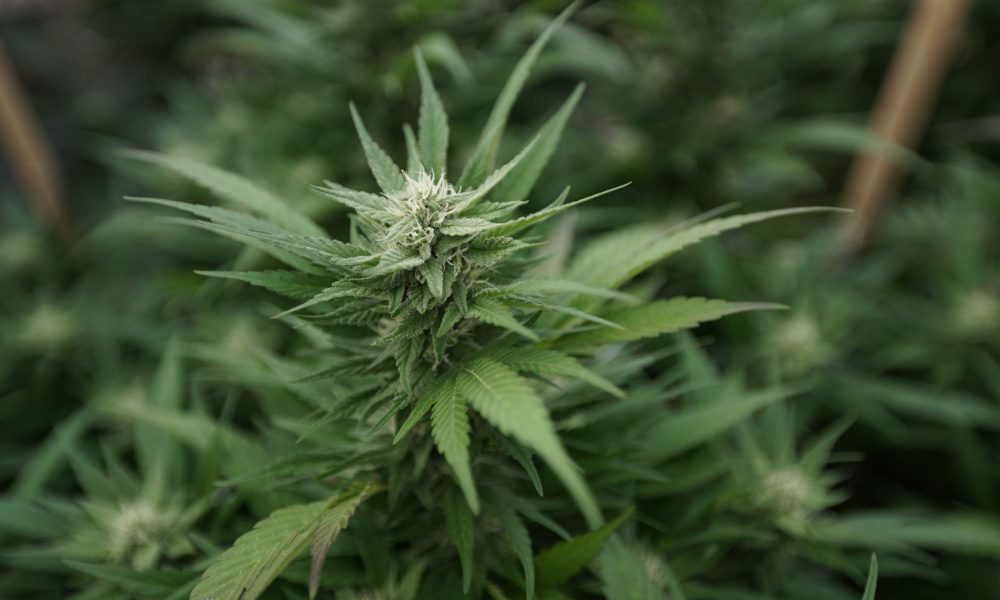A Maryland Senate committee on Wednesday took up a pair of House-passed bills to put marijuana legalization on the state’s November ballot and set initial rules if voters approve the reform, with some lawmakers raising concerns about the limited scope of the implementation proposal and questioning why the ballot question doesn’t contain more specific language around issues like licensing and equity.
The Senate Finance Committee held the hearing on HB 1 and HB 837, both sponsored by Del. Luke Clippinger (D), about a month after they cleared the opposite chamber.
The meeting also took place days after a key Maryland House committee advanced a Senate-approved budget bill, adding new amendments that would allocate tens of millions of dollars in funding to implement marijuana legalization with the expectation that the reform will ultimately be enacted this year.
Clippinger is the chairman of the House Judiciary Committee, which reported the bills out favorably last month before sending them to the floor. He also led a marijuana workgroup that House Speaker Adrienne Jones (D) formed last summer to study the issue.
The first of the chairman’s proposals, HB 1, would ask voters to approve an amendment to the state’s constitution to legalize cannabis use and possession by adults at least 21 years old. It would further direct lawmakers to set laws to “provide for the use, distribution, regulation, and taxation of cannabis within the state.”
Clippinger’s second measure, HB 837, is designed to set up initial rules for a legal marijuana market if voters approve the policy change.
—
Marijuana Moment is already tracking more than 1,000 cannabis, psychedelics and drug policy bills in state legislatures and Congress this year. Patreon supporters pledging at least $25/month get access to our interactive maps, charts and hearing calendar so they don’t miss any developments.![]()
Learn more about our marijuana bill tracker and become a supporter on Patreon to get access.
—
It specifies that the purchase and possession of up to 1.5 ounces of cannabis would be legal for adults, and it would remove criminal penalties for possession of up to 2.5 ounces. Adults 21 and older would be allowed to grow up to two plants for personal use and gift cannabis without remuneration.
Past convictions for conduct made legal under the proposed law would be automatically expunged, and people currently serving time for such offenses would be eligible for resentencing. The legislation makes it so people with convictions for possession with intent to distribute can now petition the courts for expungement three years after serving out their time.
It would further establish a Cannabis Business Assistance Fund to support equity initiatives for minority- and women-owned businesses. That fund would go toward incubator and educational programs to promote participation in the industry by people most impacted by criminalization.
To understand the effects of legalization on the state and its residents, the statutory bill would also establish various research initiatives, including studies into youth impacts, use patterns, impaired driving, advertising, labeling, quality control of products and barriers to entering the industry. A baseline study would be conducted before legalization, and updates would be sent to the governor every two months.
If voters approve legalization in November, it wouldn’t take effect immediately. Possession of small amounts of cannabis would become a civil offense on January 1, 2023, punishable by a $100 fine for up to 1.5 ounces, or $250 for more than 1.5 ounces and up to 2.5 ounces. Legalization for up to 1.5 ounces wouldn’t kick in for another six months.
Advocates have taken issue with that drawn-out timeline.
“I think we’ve tried to take a lot of what we’ve been able to determine works in other states and put it into this legislation,” Clippinger said during Wednesday’s Senate committee hearing. “I can’t promise that it is going to be going to be perfect.”
“We do need to learn also when other states have run into problems with obstacles in their implementation process—and you can look around the country, challenges that people have faced in Maine and in other places related to their recreational cannabis programs,” he said. “I believe this legislation responds to those missteps and ensures that we get our program right and get our program right to the very best of our ability.”
Clippinger and other lawmakers have indicated that they want to tackle comprehensive regulations for an adult-use marijuana market next year after voters weigh in on the issue at the ballot, but certain senators, including Senate President Bill Ferguson (D), have expressed skepticism.
Ferguson said last year that he favored legalizing cannabis through the legislature rather than waiting to ask voters on November’s ballot. This month, however, he expressed openness to the referendum idea, but stressed that voters deserve to know more details of what a legal cannabis market would look like than is provided in the House bills.
At Wednesday’s hearing, Sen. Stephen Hershey (R) asked why the legislation doesn’t include “industry-type language” or tackle issues like taxation. Clippinger replied that it’s important to carry out certain studies first, including those dealing with market disparities, before proceeding with more prescriptive regulations.
Hershey said he felt the legislation “doesn’t address what I really think people believe that they’re voting on when they vote on this question,” referring to the more simple HB 1 ballot proposal. He specifically touched on a lack of licensing regulations in the non-ballot bill.
“We’ve, in a sense, just kind of kicked the can down the road and said, ‘OK, we’ll do something on or around January 1, after the voters come back,’” the GOP senator said. “And this is the same way that we handled sports betting, and we saw that we got to a very late start with that.”
Sen. Antonio Hayes (D) separately remarked that he found it “somewhat offensive” that the referendum measure, HB 1, fails to “provide some restitution or reinvestment to these communities that have been disproportionately affected.”
The House sponsor replied that he doesn’t feel that such language “necessarily needs to be added to the referendum question,” and he feels equity issues would be better addressed by lawmakers if legalization is ultimately enacted at the ballot.
Sen. Malcolm Augustine (D) challenged the need for a disparity study before developing specific regulations to support equity initiatives, but Clippinger said that tying in the disparity research would help lawmakers more effectively address the issue and barriers to market participation for communities most impacted by prohibition in 2023.
Another issue that was brought up in the hearing came from Sen. Justin Ready (R), who said he would prefer not to have legalization enacted as a constitutional amendment decided by voters at the ballot.
“To me, this is an issue where people elect their representatives to cast a vote on tough issues,” Ready said.
Meanwhile, there are at least three other competing legalization bills that have been filed in the state legislature this session.
On the Senate side, Sen. Brian Feldman (D) last month introduced SB 833, which would also ask voters to approve a constitutional amendment legalizing cannabis for adults. That measure, like Clippinger’s plan, would go to voters in November and take effect in July 2023.
Feldman’s 83-page bill would allow home cultivation of up to four plants per adult, with a maximum of eight plants per residence. It would also package the constitutional amendment and basic regulatory framework in a single piece of legislation, unlike Clippinger’s bifurcated package.
He said at the hearing that “we look forward to working with” Clippinger on this legislation after hearing “some of the questions and issues that have popped up” in the committee.
Another Senate bill in play this session, SB 692, from Sen. Jill Carter (D), would set higher possession amounts of up to four ounces of marijuana and would allow home cultivation of up to six cannabis plants. Possession in excess of those limits would carry no more than a $150 fine, and past criminal records would be cleared for certain cannabis-related charges.
Both Senate bills were discussed earlier this month in the Senate Finance Committee.
A competing legalization bill on the House side, HB 1342, was introduced last month by Del. Gabriel Acevero (D). It had a brief committee hearing on March 8.
More than two dozen advocacy groups—including ACLU of Maryland, NAACP Maryland State Conference, League of Women Voters of Maryland and Maryland Office of the Public Defender—sent a letter to Maryland legislative leaders last week demanding that racial and socioeconomic equity be placed at the forefront of any attempts to legalize marijuana in the state.
A recently released poll of Maryland voters from ACLU found that 66 percent are more likely to support marijuana legalization if it includes relief for past convictions; 65 percent are more likely to back it if the reform stops police from using the odor of cannabis as probable cause for a search and 61 percent are more likely to be on board with legislation if marijuana can’t be used to deny housing or child custody or negatively impact parole or probation status.
Maryland lawmakers are also considering separate legislation this year to decriminalize drug possession and fund access to psychedelics for therapeutic uses.
When it comes to marijuana, legalization began to advance through Maryland’s legislature last session, but no votes were ultimately held. The Senate Finance Committee held a hearing last March on a legalization bill sponsored by Feldman and Ferguson. That followed a House Judiciary Committee hearing on a separate cannabis proposal in February.
Lawmakers then worked to reconcile the differences between the House and Senate proposals in hopes of getting something to the desk of Gov. Larry Hogan (R). Hogan has not endorsed legalization but has signaled he may be open to considering the idea.
A poll in October found that the state’s residents are on board with the policy change. Two-thirds (67 percent) of Marylanders now back legalizing cannabis, according to a Goucher College survey. Just 28 percent are opposed.
Maryland legalized medical marijuana through an act of the legislature in 2012. Two years later, a decriminalization law took effect that replaced criminal penalties for possession of less than 10 grams with a civil fine of $100 to $500. Since then, however, a number of efforts to further marijuana reform have fallen short.
A bill to expand the decriminalization possession threshold to an ounce passed the House in 2020 but was never taken up in the Senate.
Also that year, the governor vetoed a bill that would have shielded people with low-level cannabis convictions from having their records publicized on a state database. In a veto statement, he said it was because lawmakers failed to pass a separate, non-cannabis measure aimed at addressing violent crime.
In 2017, Hogan declined to respond to a question about whether voters should be able to decide the issue, but by mid-2018 he had signed a bill to expand the state’s medical marijuana system and said full legalization was worth considering: “At this point, I think it’s worth taking a look at,” he said at the time.
As for Maryland lawmakers, a House committee in 2019 held hearings on two bills that would have legalized marijuana. While those proposals didn’t pass, they encouraged many hesitant lawmakers to begin seriously considering the change.
Photo courtesy of Chris Wallis // Side Pocket Images.
Medical Disclaimer:
The information provided in these blog posts is intended for general informational and educational purposes only. It is not a substitute for professional medical advice, diagnosis, or treatment. Always seek the advice of your physician or other qualified healthcare provider with any questions you may have regarding a medical condition. The use of any information provided in these blog posts is solely at your own risk. The authors and the website do not recommend or endorse any specific products, treatments, or procedures mentioned. Reliance on any information in these blog posts is solely at your own discretion.







